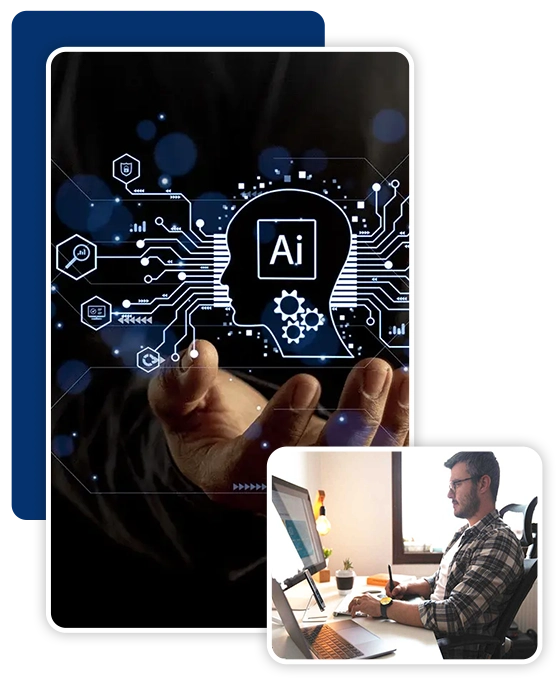Master MSc Artificial Intelligence in AI
With the rapid development of artificial intelligence technologies and the reliance of companies and institutions on smart solutions to enhance their operational efficiency and make data-based decisions, the Faculty of Engineering and Information Technology at Vertex University offers a Master of Artificial Intelligence program to keep pace with these changes and develop specialists who are able to innovate in this vital field.
The program aims to prepare engineers specialized in designing and developing artificial intelligence systems that are capable of self-learning, analyzing big data, and making automatic decisions. It also focuses on enabling students to develop smart algorithms, implement advanced artificial intelligence applications, and analyze complex systems to improve industrial and research processes.
The program focuses on developing students' technical and practical competencies as they learn to design and develop deep neural networks, build machine learning models, and analyze data. Students also gain experience in pattern recognition, artificial intelligence in robotics, and smart application development using tools such as TensorFlow, Keras, PyTorch, and OpenCV, giving them the ability to make data-driven decisions.
The program provides an integrated learning experience that combines theoretical knowledge and practical application. It includes advanced research projects, case studies, and practical training in the student's country in technology companies, research and development laboratories, and industrial institutions. Field training provides students with an opportunity to gain practical experience in a real work environment, helping them apply artificial intelligence techniques in improving engineering systems.
The program is delivered by a group of faculty members with deep academic and professional experience, ensuring a modern curriculum that is compatible with the latest developments in the field of artificial intelligence. The university also provides an integrated learning environment that encourages innovation, applied research, and interactive learning, supported by the latest technologies and digital tools, and specialized laboratories for applied experiments.
The program offers its graduates excellent career opportunities in various sectors, where they can work in technology companies, research centers, industrial enterprises, cybersecurity, and smart robots. They also have opportunities to analyze data, develop artificial intelligence systems, design smart algorithms, and create advanced technological solutions, which opens up broad prospects in the local and global markets.
Our Vision and Mission
We produce engineers and experts who are able to design smart systems that make a real difference and contribute to building an ethical and sustainable digital future.
Our Vision
Academic leadership in preparing leaders of artificial intelligence technologies and enabling them to design smart systems that have a global impact on innovation and digital transformation.
Our Mission
Qualifying specialists with scientific depth and applied skills to develop advanced artificial intelligence solutions based on data, ethics, and sustainable impact in the digital economy.
- Acquire a comprehensive understanding of the concepts, theories, and modern techniques of artificial intelligence, enabling students to critically and effectively evaluate and develop smart solutions.
- Develop the ability to analyze and develop artificial intelligence models using logical reasoning, statistics, and advanced algorithms to enhance the efficiency and performance of smart systems.
- Improve applied skills in implementing artificial intelligence techniques in multiple environments, such as robotics, natural language processing, and computer vision.
- Develop proficiency in using specialized software tools such as TensorFlow and PyTorch to design and train artificial intelligence models and analyze their performance.
- Enable students to evaluate and apply different performance standards to measure the efficiency and accuracy of artificial intelligence models in practical scenarios.
- Study the full life cycle of a machine learning system, from processing raw data to developing models, analyzing results, and improving performance.
- Enhance the ability to deal with the impact of data and computing resources on the accuracy and efficiency of artificial intelligence systems, with the ability to improve performance according to different requirements.
- Develop critical and creative thinking skills to design innovative artificial intelligence solutions capable of addressing complex technical problems.
- Employ the latest advances in machine learning to analyze big data and deduce accurate patterns that support effective decision-making.
- Integrating artificial intelligence techniques with other fields such as cybersecurity, medicine, and industry to improve the performance of current systems and provide advanced solutions.
- Enhance research skills in the field of artificial intelligence by analyzing recent developments and conducting advanced experiments to develop new technologies.
- Application of artificial intelligence techniques in real work environments through research projects and practical training in technical and industrial institutions.
- Improve programming skills and algorithms related to artificial intelligence, enabling students to develop customized solutions that suit market needs and advanced applications.
- Studying the impact of artificial intelligence on the economy and society, and evaluating ethical issues and responsibility in developing artificial intelligence systems.
- Building a generation of engineers and researchers who are able to lead innovation in the fields of artificial intelligence and contribute to the development of future technologies.
Teaching methods and strategy

case studies
The Master of Artificial Intelligence program is based on the analysis of advanced case studies from multiple fields. Students learn how to apply artificial intelligence techniques in real work environments. The experiences of companies and organizations that have relied on artificial intelligence in sectors such as healthcare, manufacturing, and cybersecurity are explored, helping to understand the impact of these technologies on improving efficiency and making automated decisions. Emphasis is also placed on the use of smart algorithms and statistical analysis to enhance the performance of systems, and studying innovations that have contributed to the development of more accurate and sustainable artificial intelligence models.

Practical projects
The program provides an opportunity for students to work on research and applied projects that reflect the actual challenges that companies and institutions face when using artificial intelligence techniques. By developing solutions based on deep learning, natural language processing, and computer vision, students gain practical experience in designing and implementing intelligent systems that can improve operational processes and solve complex technical problems. Students are encouraged to use the latest software tools and cloud platforms to develop artificial intelligence applications and effectively analyze their results.

Teaching strategies
The Master of Artificial Intelligence program is based on an interactive educational approach that combines theoretical study and practical application. The lectures are delivered via e-learning platforms, along with virtual workshops and interactive training courses covering the latest developments in the field of artificial intelligence. Digital simulation techniques and problem-based learning are used, giving students an opportunity to acquire data analysis skills, design smart models, and develop AI-based solutions for different industries.
What can you do with a master's degree in artificial intelligence?
A master's degree in artificial intelligence offers diverse and rewarding professional opportunities in several advanced technical fields. Here are some of the prominent jobs that holders of this degree can pursue:
From learning rooms to areas of change... this program is your gateway to impact making.
- Machine learning engineer
- artificial intelligence engineer
- data scientist
- Business intelligence developer
- A world of robots
At Vertex University, we prepare our students not only to understand artificial intelligence, but to lead it.
- Research scientist in artificial intelligence
- Natural language processing engineer
- Computer vision engineer
- Data engineer
- Smart process automation engineer
Get a consultation
Free now
Do you want to help?
+1 (984) 382-6080
Target group for the Master of Artificial Intelligence Program

The Master of Artificial Intelligence program targets a wide range of individuals who aspire to specialize in one of the most advanced and influential fields of technology. Target groups include:
- New graduates in technical disciplines with a bachelor's degree in computer science, engineering, mathematics, or any related field, who seek to acquire advanced skills in artificial intelligence and embark on a distinguished career path.
- Professionals working in the technology sector who work in the fields of programming, data analysis, or software development, and want to expand their expertise by learning artificial intelligence techniques and applying them in their projects.
- Those interested in moving to the field of artificial intelligence who aspire to change their career path and benefit from the increasing demand for artificial intelligence experts in various sectors.
- Innovators and startup owners seeking to incorporate artificial intelligence techniques into their businesses to improve performance and increase efficiency.
Enhance your professional skills with international certifications
This course is delivered via the Coursera platform and aims to provide learners with basic knowledge of artificial intelligence, including machine learning, deep learning, and neural networks. The program includes practical applications using IBM Watson tools, such as the development of virtual assistants and computer vision technologies.
This certification focuses on verifying basic knowledge in artificial intelligence and machine learning, as well as the concepts of generated artificial intelligence and use cases. It targets individuals using artificial intelligence solutions on the AWS platform and is a preparatory step for more specialized certifications in this field.
This certificate is one of the most important certificates in the field of artificial intelligence. It focuses on technical skills in machine learning and big data processing. Those with this certification learn how to analyze massive amounts of data and turn it into actionable information, helping companies make informed decisions.
This program is offered via the IDEX platform and consists of two courses: Introduction to Computer Science and Introduction to Artificial Intelligence using Python. The program aims to build a strong foundation in the concepts of computer science and artificial intelligence, including data structures, algorithms, and machine learning.
This certification focuses on providing professionals with the knowledge and skills needed to design and develop artificial intelligence solutions in business environments. Topics covered include: machine learning, natural language processing, and computer vision.
This certificate proves the ability of its recipients to design and build effective machine learning models and ensure their scalability and dissemination. It focuses on machine learning applications using Google Cloud services.
The Stanford Institute offers a professional program in artificial intelligence that focuses on the principles and practical applications in this field. The program covers topics such as deep learning, neural networks, and robotics.
Admission Requirements
- Regular admission: the student applying for the graduate program must have a bachelor's degree from a reputable university or from the student's country.
- Applicants obtain a bachelor's degree in computer science, software engineering, artificial intelligence, applied mathematics, or any related discipline from an accredited university.
- English language proficiency if the language of instruction in the program is English, with passing the approved language test.
- Conditional admission: The university may offer conditional admission to applicants until all admission requirements are met (terms and conditions for this category apply).
- Submit official documents including the original Bachelor's degree and transcript, along with true copies.
- Fill out the electronic application form through the admission and registration portal at the university.
- Pay the registration fees and tuition fees prescribed in accordance with the university regulations.
- Comply with the university's rules and regulations by signing an official pledge.
Required Documents
- A colored copy of the bachelor's degree issued by the student's country “Ministry of Higher Education”.
- A colored copy of the student's or family ID for matching.
- A colored copy of the student's passport.
- Personal photo (6*4) with a white background.
- Complete the registration data and sign it by the student.
Requirements for Obtaining Master in MSc Artificial Intelligence in AI Specialization
| Number of Credit Hours Required to Complete the Master Degree | 36 Minimum Required Credit Hours |
|---|---|
| Number of Required Academic Semesters | 4 Academic Semesters |
| Number of Semesters per Year | 3 Semesters |
| Annual Credit Hours | 45 Credit Hour |
| Semester Duration | 8 to 10 weeks |
| Expected Duration to Complete the Program | 1 year and 8 months |
Advantages of this system.
- Complete the master's degree in a short time: the program can be completed in one and a half years instead of two or three years.
- Flexible distribution of materials: materials are distributed throughout the year, allowing continuous learning without long interruptions.
- An intensive schedule: allows you to finish school quickly and is suitable for students who want to enter the labor market as soon as possible.
*This system was designed at Vertex University to enable students to obtain their university degree in a shorter time while maintaining the quality of education and the efficiency of the academic process.

Want to get more information?
Register your details and we will contact you as soon as possible
Frequently Asked Questions about Master MSc Artificial Intelligence in AI
The college programs provide a comprehensive learning experience that combines a solid theoretical foundation with advanced practical application.
Courses include realistic technical projects, global case studies, digital simulation models, and training on modern professional tools, which qualify students to deal with the challenges of the digital age efficiently and professionally.
Yes, academic programs are designed to comply with international standards of accreditation and quality. The university also seeks the accreditation of prestigious international institutions.
The programs focus on the skills required in global markets such as artificial intelligence, cybersecurity, data analysis, and cloud engineering, which enhances international employment opportunities for our graduates.
The College adopts an interactive e-learning method based on modern technologies, through recorded lectures, live broadcasts, virtual laboratories, and discussion forums.
Evaluation is carried out through standard tests, practical projects, research reports, and presentations in order to measure overall efficiency and not just theoretical memorization.
Yes, the college is keen to build strategic partnerships with technical institutions, startups and research centers, locally and internationally, to provide practical training opportunities, joint projects, or involve students in realistic challenges and digital field assignments (Virtual Internships).
The college adopts a dynamic approach in updating course content through academic and professional committees that include experts from Silicon Valley and international academics.
It also integrates technologies such as virtual reality (VR), cloud computing, and blockchain into student projects and laboratory activities, reflecting the university's commitment to the digital future.
